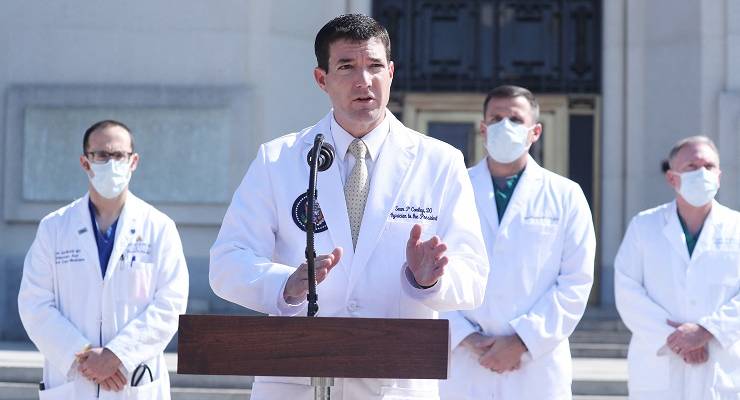
This morning Donald Trump took a joy ride around the Walter Reed National Military Medical Center to show off how well he was doing in his fight against COVID-19. You’ve got to feel for the aides who rode in the car with him, exposing themselves to the deadly disease.
Officials insist Trump has just mild symptoms, while the president has seemed upbeat in video messages to his supporters. But his treatment tells a different story, experts say. Early evidence shows the experimental drugs Trump has received may benefit only those with severe cases of the virus.
Trump has received antibody treatment REGN-COV2, remdesivir, oxygen and dexamethasone, along with zinc, vitamin D, an acid reducer, melatonin and a daily aspirin.
REGN-COV2
REGN-COV2 consists of two antibodies: one manufactured, and one isolated from humans who have recovered from COVID-19.
Queensland University Infectious Diseases Physician Dr Paul Griffin told Crikey evidence is starting to show that REGN-COV2 helps those with more severe symptoms.
“It’s a promising intervention, but it’s still undergoing assessments … it does seem premature to extrapolate this as evidence for effective treatment,” he said.
Remdesivir
Trump is receiving a five-day course of remdesivir, given via IV transfusion. The antiviral drug makes it harder for the virus to replicate, and has been used since the early days of the pandemic.
“It’s currently the only intervention which has evidence for COVID-19 treatment which suggests modest improvement in alleviating symptoms, but has no mortality benefit,” Griffin said.
Dexamethasone
Infectious disease specialist at Australian National University Dr Gaetan Burgio told Crikey dexamethasone was the most puzzling part of Trump’s treatment.
“From clinical trials, it’s only beneficial for severe cases — patients that are under oxygen but close to mechanical ventilation, where they need to be intubated,” he said.
“Clinical trials show it has an adverse effect on those who don’t need oxygen. So it’s not rational to give him that if he has just mild symptoms.”
Famotidine
“Famotidine is used for reflux and intestinal problems, and has been repurposed for COVID-19 because it might affect the virus’ ability to invade the body,” Burgio said.
A recent review using “low-quality evidence” found the drug could reduce mortality in hospitalised COVID-19 cases, especially in cases where the patient had been intubated.
Zinc, vitamin D, melatonin and aspirin
None of these over-the-counter pharmaceuticals have been shown to treat COVID-19, Burgio said. They’re commonly used to help with cold symptoms.
Treatment for the seriously sick
“It’s just bizarre,” Burgio said. “All of these treatments are for people with serious — not mild — cases of coronavirus.”
Importantly, he added, none are proven to work.
“None of them have proven efficacy. We don’t know if these treatments are safe.”








Hmm! I wonder if this kind of cocktail of drugs has been tried before (ie giving them all at once).
I think I understand why there were so many doctors standing round at the press briefing. They know what happens to doctors who get it wrong in authoritarian regiemes. No-one wanted to be the only potential culprit – everyone had to stand there and take responsibility.
Dr Conley is an osteopath!
The US military takes anyone these days.
At least we know one of the drugs listed is efficacious – where would modern medicine be without acetylsalicylic acid?
Trump only wants the best of anything so of course they would use the strongest drugs regardless of whether they might be appropriate.
As for riding in the SUV with him, his security staff have been exposed so much already it hardly makes any difference. Besides it comes with the job.
Being an atheist, at times I hope there is a god. Better than a bullet.
He’s 74 and obese. What would you do? Most of them are harmless.